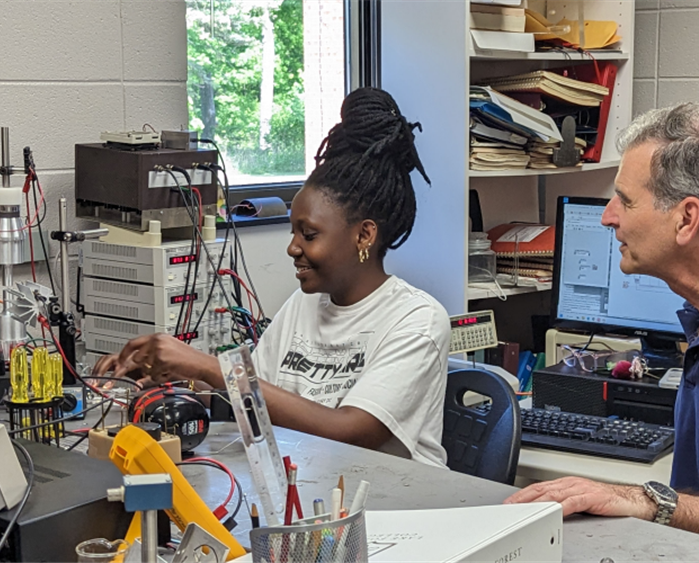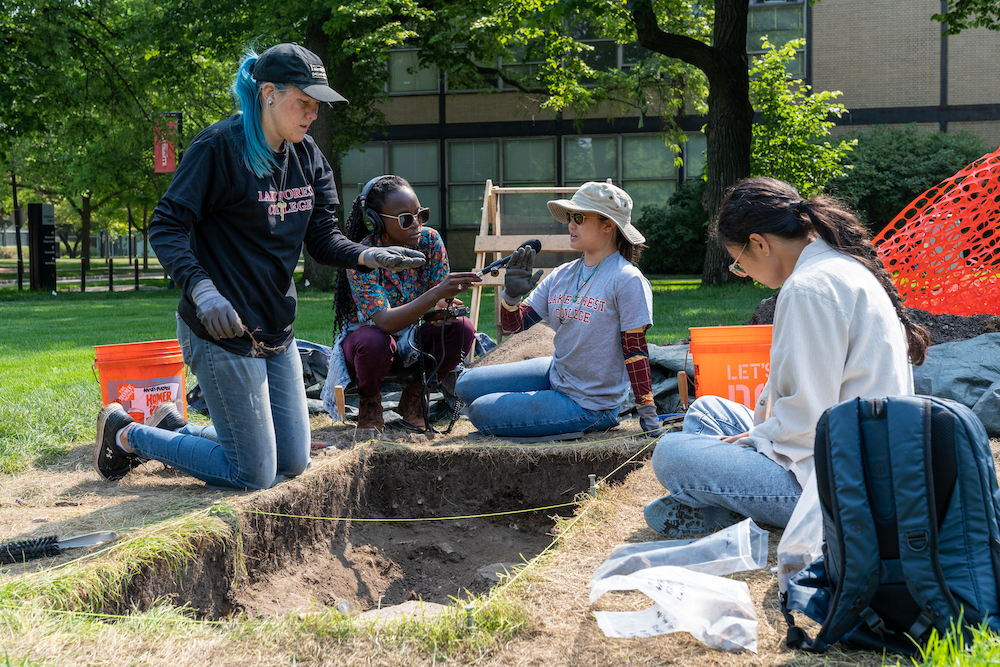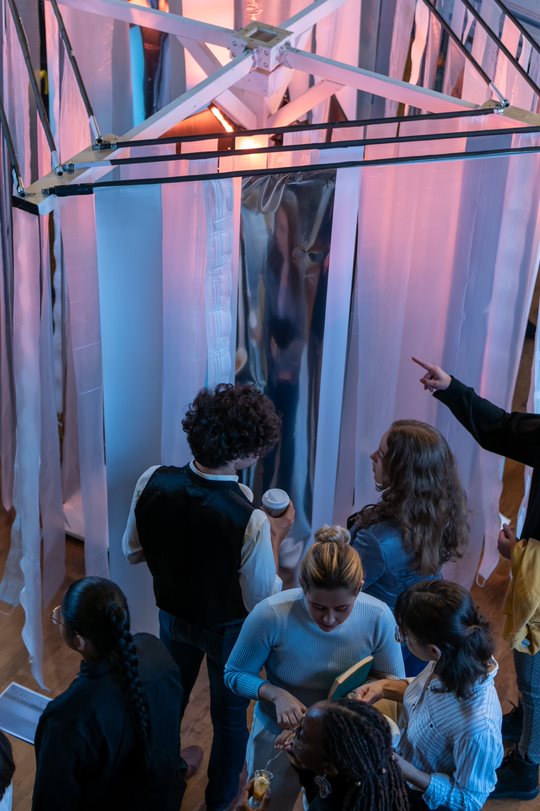Experiential learning: What it is and why it makes a difference for college students

For many college students, learning can take a variety of forms: listening to lectures in the classroom, conducting experiments in a lab, performing music, making art, and more. However, hands-on learning that allows students to put their skills into practice can take a wide variety of forms.
Colleges today recognize the importance of experiential learning as a way to prepare students for careers and graduate study. In this article, you’ll learn about what forms experiential learning can take, why hands-on work is important for student development, and how we at Lake Forest College have been at the forefront of this movement–placing students at the center of the action.
What is experiential learning?
Experiential learning is a training method that involves “learning by doing,” which is exactly what it sounds like—students gain foundational skills, knowledge, and understanding by actively participating in a hands-on setting. At the College, that can look like anything from lab work and artistic expression to independent research and internships.
Why does experiential learning matter?
Experiential learning is a key part of student development. It allows students to try out new things, gain a sense of what they enjoy, and put skills they learn in the classroom into practice. Experiential learning also provides a crucial real-world perspective to learning that helps students understand how what they learn in college impacts their career trajectory after graduation.
Professor of Psychology and Associate Dean of the Faculty Matt Kelley compiled compelling data on Lake Forest College Richter Scholars, a group of students who conduct research under a faculty mentor. Kelley’s data reveals that students who participate in this research opportunity are 3.5 times more likely to be inducted into Phi Beta Kappa Honors Society and 3 times more likely to earn a coveted Senior Award.
Additionally, the data also shows that students who participate in Richter are more likely to pursue graduate degrees. Overall, 18 percent of Lake Forest students go on to grad school; by comparison, 66 percent of Richter Scholars go on to grad school. Just under 50 percent of Richter grad school attendees complete doctoral-level degrees.
Experiential learning not only gives students a deeper look at a variety of career options, but it also gives students the confidence to pursue a path they know is right for them.
Lake Forest College integrates experiential learning into the student experience in a variety of ways that help students discover their paths and pursue their passions.
Hands-on learning in the classroom
Many classes at Lake Forest College focus on putting students in hands-on environments so they can apply the skills they are learning. These opportunities are available across disciplines. The sciences offer lab settings where students can execute experiments, and the fine arts offer opportunities for students to perform and create.
Additionally, Lake Forest College provides unique course offerings such as Associate Professor of Anthropology Rebecca Graff’s SOAN 205: Archaeology Field School, where students participate in an urban archaeological dig.

![]()
This summer, students in SOAN 205 gained invaluable hands-on experience while unearthing remains of important historical structures that lie beneath the Illinois Institute of Technology campus. Callie Elms ’24, a double major in studio art and history who is minoring in museum studies, hopes to work in museums after graduation. Participating in the hands-on archaeology course gave her an opportunity to experience field work that will help her resume stand out.
“We learned all kinds of archaeological field methods: how to use a trowel, how to sift, and how to use a total station (an electronic instrument used to give precise locations in an archaeological survey),” Elms said. “You can get a career in archaeology from this kind of experience alone.”

Associate Professor of Art and Chair of Art and Art History David Sanchez Burr’s ART 334: Installation Art class designed and installed an interactive art piece for the Glassman Symposium, a key part of the College’s annual Brain Awareness Week. The experience of collaborating on such an expansive installation helped students learn how to work on a team and how to apply their art skills to public settings. The students also had to learn how to safely construct a structure that the public could interact with.
Kim Casas ’24, art major and general manager of the campus radio station WMXM, took part in the course and learned how to work on a team in the arts. The project also required collaboration with the neuroscience department, making for an interesting interdisciplinary learning experience.
“We began by learning the effects of COVID on the brain and mental health from people in the neuroscience department who had been studying it. Once we understood what neuro was going to be focusing on, we brainstormed and figured that the best thing to present would be something unique to everyone on our team in the class, because COVID was and still is such a personal experience that different people had different experiences with,” Casas said. “We all talked about the things that we wanted to do and why we wanted to do them, and it really gave me another outlook on what the pandemic was like for people in a more humanistic and real way.”
The final product was an interactive art piece that incorporated streamers of plastic, reflective material, and masks that formed a curtain around a platform with screens that depicted faces with and without masks.
Casas and the rest of the class explored what the emotional impact of the pandemic through the art installation: “We all gained something from working on this project, whether it was empathy for those who experienced loss or grief during the pandemic or hands-on skills such as painting, woodworking, or technology installation.”

Internships
Internships are a classic and well-known form of experiential learning and are a great way to establish a foundation for career success after college. An internship can allow students to spend more time on-site learning about the field. This can help establish robust networking relationships and give learners a feel for the pulse of the industry.
In the Spring 2023 semester, biology major and environmental studies minor Brayden Saunders ’24 interned at the Chicago Botanic Garden, one of the world's great living museums and conservation science centers.
The experience Saunders gained studying bumblebee populations gave him the confirmation that hands-on research is something he may pursue after graduation.

According to the National Association of Colleges and Employers, students completing a paid internship are about twice as likely to land a job after graduation compared to those who did not—receiving an average of 1.61 job offers compared to 0.77 job offers for non-interns. Among Lake Forest College’s own 2023 graduates, 66% of graduates with jobs were offered a job by their internship site.
Internships are a key part of Lake Forest College’s career-preparation strategy for students, with the highest-ever number of students completing internships for academic credit during the 2022-23 academic year. For the fifth year in a row, Lake Forest College has been ranked by the Princeton Review in their top 25 rankings of “Best Schools for Internships,” ranking #18 in the nation for the 2023 “Top 20 Best Schools for Internships (Private Schools)” list.
“Through the CAC’s Academic Internship program, students build career readiness and further clarify their career interests,” Assistant Vice President for Career Advancement and Director for the Gorter Family Career Advancement Center Colleen Monks said. “Our program is distinctive both in our strong employer partnerships that give our students access to amazing opportunities locally and in Chicago, as well as in our innovative curriculum that encourages students to reflect on how they are applying their valuable liberal skills to the workplace."
Music major, entrepreneurship minor Alex Glassman '23 discovered new possibilities with music and video during his internship with Ravinia Music Festival. Listen to Alex's perspective on what he learned and made with his internship.
Research
Gaining high-level research experience early in an undergraduate career is uncommon at most schools, but at Lake Forest College, it’s our way of operating. We prioritize research early on by allowing students to participate in the Richter Scholar Program the summer after their freshman year.
Lake Forest College's Richter Scholar Summer Research Program provides students with the opportunity to conduct independent, individual research with Lake Forest College faculty early in their academic careers. The partnership between faculty and students creates strong bonds for all those involved in the program. Projects span across disciplines, inviting students from various departments and areas of interest to participate in valuable research opportunities.
Neuroscience and biochemistry and molecular biology major Federica Bertolotti ’24, an international student from Uruguay, recently received two major grants to support the research of her senior thesis. Her interest in this research stemmed from a Richter opportunity, and the research she is completing will hopefully carry her into a graduate program where she can continue her work studying neurodegeneratation.
“My main reason for choosing Lake Forest College was because of the focus on research and variety of research opportunities,” Bertolotti said. “I was seeking a place where research was guided by professors, and here I am able to do research with Dr. DebBurman. It's fulfilling to work with mentors who actually care for us.”
Alumnus Paul Jones ’17 is pursuing a PhD in molecular cell biology at Washington University in St. Louis and was recently awarded the prestigious Young Investigator Award from the Children’s Tumor Foundation. A 2014 Richter Scholar, he credits the program with his current successful career trajectory: “I would not be in the same spot I am now without the deep level of research experience I got through the Richter Scholar Program.”
Research experience prepares students for future high-level graduate research and engaging careers beyond the College. Beyond Richter, students can assist with professor research as a student worker, complete a research-based senior thesis, and or participate in other research programs such as the English department’s Fielding Fellows program or the RFU Rosalind Franklin University of Medicine and Science Summer Scholars program.
Student worker positions and volunteering
Lake Forest College, like many higher education institutions across the country, employs students in a variety of roles on campus. Students can get paid, be involved in campus operations, and gain experience that is relevant to their career goals while in school.
For example, students interested in graphic design careers have assisted Director of Creative Services Emma O’Hagan, learning core graphic design skills to create posters, flyers, and other brand assets for campus. Anna Ceslavska ’25, a data science major and economonics minor, works in the College’s Office of Communications and Marketing.
Ceslavaska, an international student from Latvia, worked at a marketing agency during her gap year before coming to Lake Forest College. Working in the marketing office on campus gives her the opportunity to keep her marketing skills sharp and prepare for her future career.
“It’s very welcoming here in the Office of Communications and Marketing, and I can show my initiative and am able to have creative freedom in my work. I like that every day is different,” Ceslavska said. “It has been good to do something related to my future career.”

Experiential learning in the garden
The student garden also employs students of a variety of majors who learn how to tend plants and produce sustained produce yield of vegetables and fruits. International relations major Andrea Sandoval-Torres ’26 works in the student garden. Originally from Mexico but calling England home, Sandoval-Torres is an international student and a Davis Scholar who attended UWC Costa Rica.
“I've always really liked being engaged in like gardening and nature in general,” she said. “At home in England during the pandemic, we actually tried to start a garden, so when I saw that this student worker position was open for the garden, I thought it would be a good opportunity to learn more about gardening and botany.”
Many student worker positions are funded by work study. Student worker positions are especially valuable to international students who may have difficulty finding work outside of the College without US citizenship and working visas.
Volunteer work can also be an example of experiential learning and can be valuable information to highlight on a resume.
Framing experiential learning on a resume
Experiential learning is an asset for any graduate’s resume. With many entry-level jobs requiring some form of practical experience, highlighting experiential learning on a resume is a key part of successfully landing a job in a specific field after graduation.
Because experiential learning focuses on gaining professional skills, it makes for excellent resume content that shows hiring managers the in-demand competencies a candidate will bring, such as communication, problem-solving, collaboration, and often industry-specific skills. However, formatting and organizing your experiential learning section on your resume can be tricky, especially if you have limited space or multiple types of expe
Here’s how to maximize the efficacy of your experiential learning on a resume:
- You may choose to incorporate experiential learning in a section similar to a work experience or education section on a resume.
- Highlight skills that are relevant to the jobs you’re applying for. It may be cool that you learned how to use a circular saw when building theater sets, but if you’re applying for a job in finance, it may be better to focus on data analysis skills.
- Use action verbs to write concise and compelling bullet points for each experiential learning experience.
To learn more, current students can work with their career advisor and discuss specific advice for incorporating experiential learning on their resume.
Experiential learning comes in a wide variety of forms suitable for many different learning styles. College students who engage with experiential learning benefit from the hands-on opportunities. To get involved in experiential learning, talk to professors across campus and connect with your career advisor for internship opportunities.

